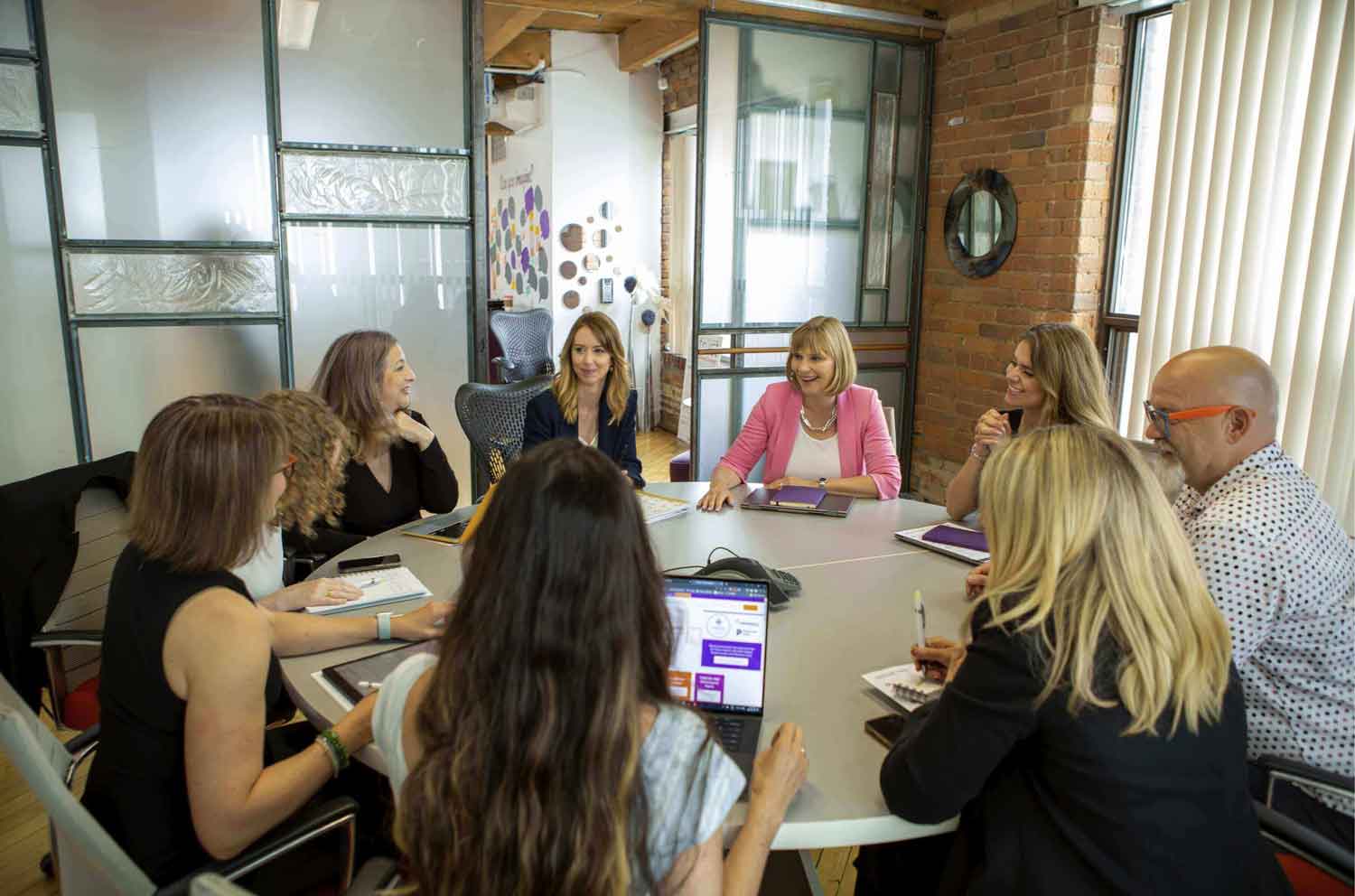Here at The Roundtable, we work closely with HR and L&D leaders. Here are some of the key topics that are bubbling up in organizations across North America.
1.) Employee Wellbeing and Mental Health
Top. Of. The. List. Keeping employees safe during the COVID-19 outbreak began has been a priority in HR departments. As the pandemic carries on and we are 10 long months in, there is an underlying feeling of malaise… many leaders and team members are feeling anxious, fatigued and close to burning out. If this continues unchecked, it will — without a doubt —impact key HR measurements like engagement, productivity and absenteeism in 2021.
Protecting employee mental health is crucial in these challenging times. As we head into the dark days of winter, it’s predicted that employees’ mental health will decline even more as stresses from general uncertainty, the holidays and colder weather aggravate issues. It’s little wonder some experts are saying that Canada is on the cusp of a mental health crisis. Deloitte is reporting that the mental health fallout from COVID could last years.
HR professionals are keeping a sharp focus on building resilience and promoting flexibility to help keep a good work-life balance. Communication and a feeling of social connection between team members and amongst leaders are important protective mechanisms against feelings of isolation, depression and anxiety. This resilience-building is something we see constantly at The Roundtable in our group coaching programs. While the cohort members take on challenges relating to strategic organizational priorities, other more personal struggles are shared and tackled, like how to juggle high performance pressure when you have a young family at home.
2.) Remote Work & Learning
Behemoths like Microsoft, Google, Facebook, and Twitter have all announced that they are extending work from home protocols into 2021, and are not in a hurry to call employees back to the office.
Even when the coronavirus pandemic is over, Microsoft says it will allow most of its employees to work from home indefinitely. Many organizations are leaning into the concept of a hybrid working structure, allowing employees to work from home or come into the office. Empowering employees to have more control and make their own decisions also plays a significant role in worker happiness.
In the learning landscape, in-person professional development off-sites are a thing of the past for the foreseeable future. Throughout 2021, we will see HR and L&D leaders quickly pivot to embrace the idea of peer-to-peer learning, as demonstrated recently by Siemens, which is implementing coaching circles that allow employees to work in cohorts on common topics with the support of coaches. Learning amongst smaller groups of cross-functional leaders is helping to build deeper relationships and create “future-focused learning ecosystems.”
3.) Diversity, Equity and Inclusion
McKinsey has just recently reported that despite women in the C-suite growing from 17% to 21% between 2015 and 2020, women remained dramatically underrepresented—particularly women of colour.
Yet, the case for building a culturally diverse and gender-balanced workforce is clearer and stronger than ever. Gartner research says that organizations that implement diversity networking programs are 3.4 times more likely to report they are effective at increasing opportunities for talent mobility.
It’s been proven that better organizational diversity, equity and inclusion can meaningfully effectuate positive corporate culture change. Inclusive organizations are more likely to embrace family-friendly policies and champion diversity. And, as McKinsey also notes, company profits and share performance can “be close to 50 percent higher when women are well represented at the top.”
In the #MeToo and #BlackLivesMatter era, organizations around the world are casting a critical eye inward to shift from organizational awareness about diversity, equity and inclusion issues to actively adopting new behaviours, language skills and a deeper level of understanding on how to be an effective ally to promote gender and racial equality. Expect to see more of these initiatives rolled out in 2021.
4.) The Great Skill Shift
Even though there has been a greater emphasis on developing “soft skills” like greater empathy, communication and collaboration, the pandemic has amplified the need for leaders to have a much higher level of emotional intelligence. Especially as teams continue to work remotely, that ability for leaders to connect and engage with their teams is fundamental to the future of work, and the retention and development of high-potential employees.
More durable skills that are long-lasting, transferable across functions and roles, will be the priority. Not only are these “softer” skills essential for organizational growth and success, but the type of soft skills has changed in importance. Prior to the pandemic, skills like creativity and persuasion were ranked as most important, and now we are seeing emotional intelligence and adaptability top the list.
Equally, if organizations want to be able to navigate and agilely maneuver the waters of disruption in 2021, then the command-and-control or the “heroic leader” approach will have to go. In the coming year, we will see a rise in the democratization of leadership — accountable leaders who flatten the hierarchy by sharing leadership and working in tandem with each other as well as their teams.
5.) Employee Experience
Companies are not only cautious about boosting salaries, a full 1/3 of Canadian employers are planning on suspending or freezing raises, and 6% intend on pay cuts in 2021. To counterbalance this unpleasant sting, HR professionals are putting their efforts into improving the employee experience. In fact, across HR – 31% of Chief Human Resources Officers (CHROs) report that employee experience is a priority.
Not only will this entail creating new employee journeys for the remote world and providing flexible work options, but it will seep into how companies approach employee development. Typically, HR has had a standardized, one-size-fits-all approach to learning. In 2021, we will see a move towards an approach where the individual needs, skills and capabilities of employees is the starting point.
By focusing on employee experience, especially around issues like emotional drivers and value alignment, HR can help propel a culture that emphasizes employee value and employee contribution. The knock-on effect is a stronger, more cohesive culture and closer, more committed, engaged employees – all key factors in helping companies to thrive in 2021 and beyond.
What are Your Priorities in 2021?
Leave a comment – I’d love to hear from you. If your organization is looking for ways to navigate disruption, break down silos and improve employee experiences, The Roundtable can help. If you’d like to learn more about how you can convert your existing leadership programming into virtual group coaching programs or how to maximize your existing one-to-one executive coaching programs into high impact group programs that develop durable skills, feel free to reach out to me to discuss your strategic priorities.



